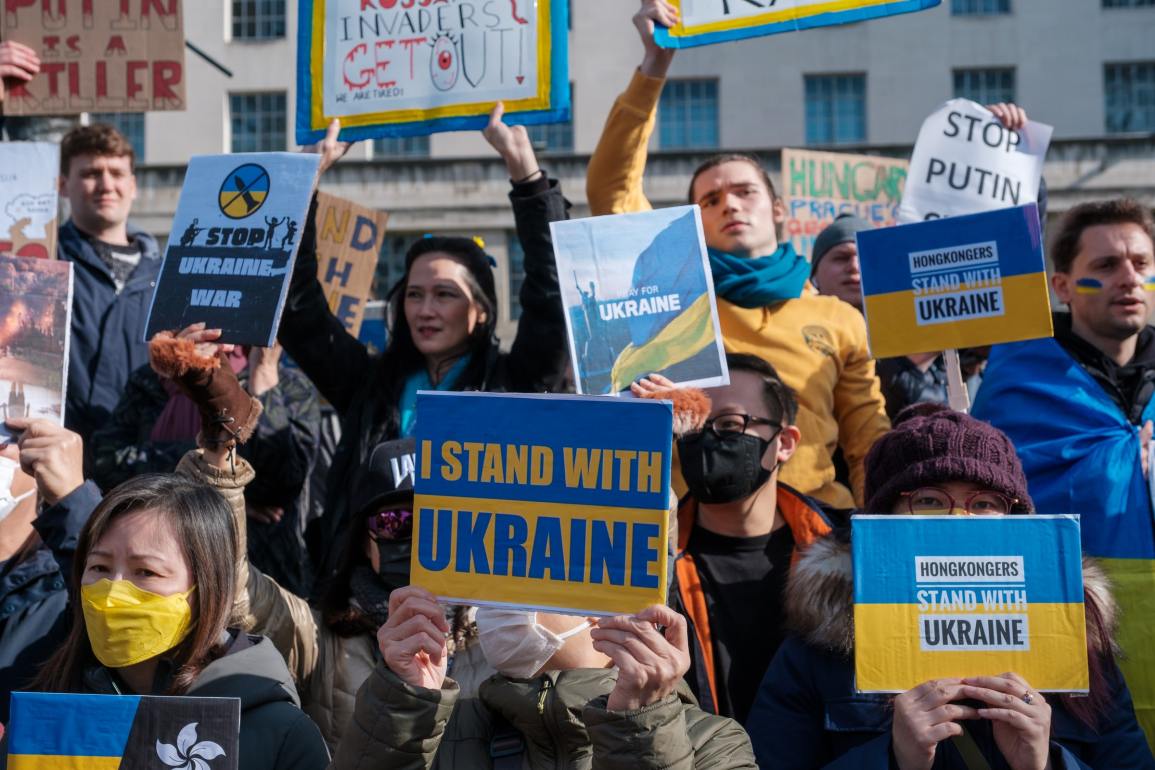The war on Ukraine has captured global news attention, resulting in some poorly worded takes that highlight racial bias. For example:
- NBC’s Hallie Cobiella reminded viewers that “these are not refugees from Syria… They’re Christians, they’re white” (The Independent).
- Peter Dobbie from Al Jazeera stated that those fleeing Ukraine looked like “any European family that you’d live next door to,” not “refugees fleeing the Middle East or North Africa” (Twitter).
- Charlie D’Agata from CBS News noted that Ukraine is a “relatively civilized, relatively European” country, unlike“Iraq or Afghanistan that has seen conflict raging for decades” (Twitter).
Reporting like this emphasizes the whiteness and Christianity of Ukrainian civilians, ignoring the multiethnic diversity of Ukraine’s population and the racism they face as they try to flee (Time). It also offensively suggests that the casualties of war that non-Christian people of color experience are less tragic.
TAKE ACTION
• Read media coverage critically. Who is cited as an authoritative source? Are there other ways this story might have been written? Is there more research to be done?
• Donate to support Ukrainian journalists fighting misinformation and keeping their country – and the world – updated on the latest.
• Consider: what sort of place do you visualize when you read the words “war-torn country,” “civil war,” or “missile strikes”? What kind of person comes to mind when you think of a refugee or victim of war? When you think about “civilized” or “modern” people, who comes to mind? Are these ideas connected to historic racism and xenophobia?
What Are Other Examples of Media Bias?
The framing of news stories affects how people act and what they believe. U.S. media coverage disproportionately connects Black men to drug crimes, poverty, and unemployment – building perceptions on the capacity of an entire population (The Guardian). News outlets usually write stories about protests that frame them as “nuisances” instead of examining the policies and practices protestors are challenging. This obscures the scope of the issue at hand and places undue scrutiny on people – not the systems causing harm (Nieman Lab). In contrast, descriptions of police violence against protestors generally let law enforcement off the hook through the use of the passive voice (“Pepper spray caused a short stampede…”) (Nieman Lab). Coverage of Israel-Palestine has an “overwhelming slant” towards the Israeli point of view (The Intercept). In the prelude to the invasion of Iraq, respected U.S. media outlets were almost unanimous in reporting that Iraq had weapons of mass destruction program — a false statement that directly contributed to the barbarities of the invasion and occupation (Rolling Stone, New York Magazine). People who read articles that frame immigrants in a negative light are more likely to dehumanize them and oppose pro-immigrant policies (Wired).
Generally, the media builds broader, more comprehensive narratives around people based on these characterizations. Oftentimes, these pictures perpetuate bias that harms marginalized groups. Media bias exacerbates the violence and harm inflicted upon marginalized people by those in positions of power, whether it’s through international conflict, federal policies or practices, interpersonal harm, or even individual, internalized oppression.
What Causes Media Bias?
One problem is who writes the news. Journalism has a diversity problem. Transphobic media coverage emerges from disproportionately cisgender publications (Jezebel). Racially-biased news stories aren’t surprising given that three-quarters of news staff are non-Hispanic white people (Nieman Lab).
Another problem is how media is made. Media companies naturally need to turn a profit. Outlets can’t run stories that make major corporations stop buying ad space. If a news company offends too many readers by running challenging pieces that question those readers’ biases and stereotypes, they may put themselves out of business as subscription revenue falls.
A third source of bias is industry norms determining whose voice is credible. Police spokespeople are “more authoritative” than protestors (Nature), and a White House spokesperson is considered more authoritative than the representative of a foreign government. Press releases from institutions like the Israeli Defense Force are seen as more trustworthy than accounts from Palestinian eyewitnesses (Slate). The coverage of Iraq’s fictitious weapons of mass destruction program before the U.S. invasion was almost exclusively based on the false testimony of the member of an Iraqi opposition group “cobbled together by the CIA.” His government connections made him a credible source, but his inaccurate claims went unchallenged (New York Magazine). His government connections made him a credible source, but his untrue claims went unchallenged. Statements from the government, military, or large companies can be repeated without further investigation, even though each may have the incentive to twist the truth for their benefit.
What Can We Do?
It’s important to practice critical news literacy to understand the news we consume (University of Washington). We should also remember that political institutions have political interests, whether it’s the local police department or the Pentagon. Even if the information they provide isn’t false, it’s being released in an intentional, strategic way. Finally, we need to support journalism from oppressed communities and media produced by people connected to the story. The stories we tell each other matter and the actions we support because of them can be a matter of life and death.
KEY TAKEAWAYS
• Some reporters found Ukrainian refugees more sympathetic as white Christian Europeans than other displaced peoples.
• The media tends to perpetuate harmful notions of people based on their racial/ethnic identity, class, or the country they live in.
• U.S. residents have a responsibility to ensure their government doesn’t contribute to foreign wars or displacement.
